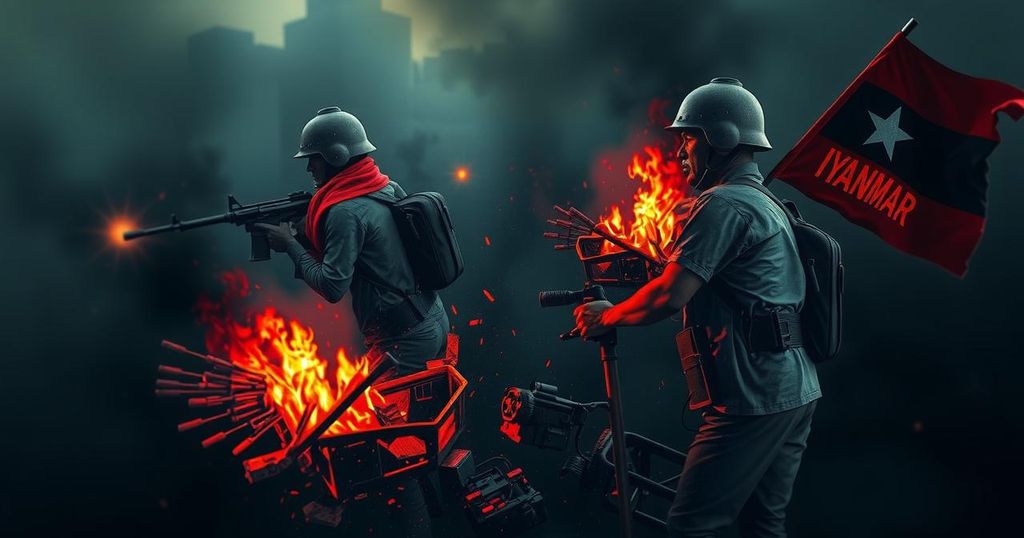Myanmar is transitioning from a hopeful democracy to a devastating civil war, characterized by severe violence from both the military junta and opposing armed groups, with the Rohingya facing ongoing persecution. The situation is exacerbated by international tensions, ineffective ASEAN responses, and rising humanitarian crises, necessitating urgent reconciliation and a united resolution to prevent permanent fragmentation.
Nearly four years following the anti-coup protests that engulfed Myanmar, the nation finds itself increasingly resembling a war-torn Syria led by an authoritarian regime than a hopeful democracy. Under the military rule of Min Aung Hlaing, the situation has escalated into a brutal civil war characterized by stark complexities and brutalities on both sides. While the military junta, supported by China and Russia, continues to commit numerous atrocities against its citizens, the ethnic armed groups opposing the junta are also accused of perpetrating violence against various ethnic communities. This complex landscape challenges the simplistic good versus evil narrative previously associated with such conflicts, as it reveals the fragmented nature of resistance groups that do not share a unified, democratic vision for Myanmar’s future. The plight of the Rohingya community, which has faced systematic persecution and genocide for decades, exemplifies the tragic situation in Rakhine state where both the military and local rebel groups contribute to their suffering. Amnesty International’s Secretary-General, Agnès Callamard noted that the Rohingya are now facing persecution from two fronts – the Myanmar military and the Arakan Army. While the anti-junta groups appear to champion human rights, many remain embroiled in historical ethnic disputes that complicate the aspired democratic framework. Additionally, the junta’s increasing military draft has instigated a mass exodus of young men and women fleeing violence and conscription, further exacerbating the humanitarian crisis. The interplay between Myanmar’s conflicts and regional dynamics, particularly with China attempting to leverage control and construct stability from outside interventions, leaves the situation precarious. Moreover, attempts by ASEAN to mediate effectively have fallen short due to conflicting national interests and divisions within the bloc regarding their approach to Myanmar’s civil war. International support for anti-junta forces is muddied by the perception of the United States’ failures in other global conflicts and its seeming failure to address the human rights violations occurring in Myanmar adequately. Activists advocating for democracy in Myanmar face hypocrisy accusations due to their selective focus on human rights, particularly the lack of support for the Rohingya people amid ongoing violence. With time for reflection since the hopeful days following the coup, the journey forwards appears daunting. UN Special Envoy Julia Bishop emphasized the need for an end to zero-sum mentalities in Myanmar to facilitate healing and reconciliation, underscoring the critical need for cooperation to avert a long-term fracture in the nation akin to Syria’s situation.
The article discusses Myanmar’s descent into civil war after a military coup ousted the democratically elected leader Aung San Suu Kyi in 2021. It explores the dynamics of conflict involving the military junta, ethnic armed groups, and the humanitarian crisis impacting various populations, notably the Rohingya. It highlights the complicity of international power plays, with an emphasis on the implications of regional dynamics driven by countries like China and the ineffectiveness of ASEAN’s diplomatic efforts. The article presents a detailed analysis of the interplay between internal conflicts and external interventions, shedding light on the complexities that hinder Myanmar’s path to democracy.
The ongoing civil war in Myanmar illustrates a complex and tragic scenario where the fight for democracy is overshadowed by ethnic violence and international interference. Both the military junta and anti-junta groups engage in severe human rights violations, while essential humanitarian crises, particularly the plight of the Rohingya, continue unabated. As global powers navigate their interests in the region, the need for a unified and compassionate approach toward reconciliation and stability in Myanmar remains paramount, lest the nation succumbs to permanent division akin to that of Syria.
Original Source: asianews.network






